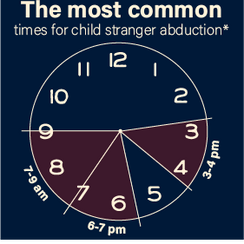
A few days before Christmas in 1984, Jim Matthews came home to an open door and an empty house. His 12-year-old daughter, Jonelle, had been dropped off from a choir concert around 8:15 p.m. and not even an hour later, she was gone. Thirty-four years later, she still has not been found. Her disappearance remains a mystery.
During that time, Jim and his wife Gloria bounced between Washington, Colorado, Kuwait, California, the Philippines and Costa Rica. They first moved to Washington with their other, older daughter, Jennifer, right before her first year of college in 1987. Later, from 2003 to 2005, the two went to Kawait. Upon their arrival back in the States, they settled in San Jose, Calif., until 2007 when the moved to Orting, Wash. After spending a year there, they went to the Philippines between 2008 and 2010. When they returned to Orting in 2010, they stayed until 2012 and then sold their house and retired to Costa Rica where they currently reside.
People may find the Matthews' moves strange, believing that parents should stay in one place and hold on to hope for the child’s return. But there is no instruction guide on how to act after a child goes missing, and everyone copes with that loss differently. The process is further complicated by feelings of self-blame, guilt, shock, disbelief, and anger. Complex Trauma Greif and Bereavement Counselor, Andrea Shindle, discusses this.
Q. Could you tell me about the effects a missing child has on a family?
A. Profound loss… I don’t think you could put words to it for parents. There just aren’t any to express the pain of not having them or an explanation for where they are. You imagine worse case scenarios.
Q. What is it like if you are a family member under suspicion?
A. I haven’t worked with anyone directly who has been blamed in that nature. But I can assume that that would cause a lot of stress for the person and their family. The unsuspected would have to try and navigate to support the missing child and also figure out complications brought by familial love for the suspect.
Q. Are there any commonalities between families or are they all different?
A. A big couple of commonalities are a deep sense of self blame and guilt… From the outside we see it wasn’t the parent’s fault, but as a parent it seems like your most important role to protect your children. There’s also complex problems in long unsolved cases where them moving on feels like they are abandoning that child, essentially, a lack of closure.
Q. What is one thing you would tell parents or families of missing children?
A. That their suffering is not without purpose and that their child’s life is not without purpose. That wanting to leave a legacy for your child’s honor is something to be inspired by. All of the parents I work with have a commitment to a child’s legacy, making sure people don’t forget their child
Q. Tell me about coping mechanisms. What are healthy vs. unhealthy ones?
A. Really, I see coping as mechanisms as a way of communicating what they are going through. Any can be productive. Let’s say the parent is using sleeplessness. It tells me that I need to validate her experience, and work though it until she feels safe enough to sleep. A lot of these mechanisms are physiological and out of the control of the individual. This is true across complex grief cases, but when a child goes missing, it is based on shock and confusion, and a feeling of internal disorganization because it is never expected.
Q. Are there any patterns you notice about families who experience this trauma?
A. Shock, disbelief, anger, and self-blame. Initially, parents spend time remembering only the good parts of the person. Usually after they’ve had that time to honor the person is when anger starts to surface, followed by a lot of self-blame, guilt etc. And at the end comes post-traumatic growth which is where parents find that sense of purpose from the loss and become law makers, community advocates etc. It is the most inspiring thing to see.
Q. What are some resources you commonly send families to?
1. The Community Grief Center is wonderful. It is run by Dr. Debby Baker. They have a support group for moms who have lost children.
2. I also encourage them to explore spiritual development and encourage family participation in the counseling process so they can heal together.
3. I recommend they go their doctor, because pain can manifest physiologically as well.
4. The last thing is to get in to counseling. Especially in cases of suicidal thoughts because usually it is not that they want to die but that they want to be with their child. They are afraid to talk about it though because they do not want to be hospitalized by voicing their feelings.
Q. How do people find you?
A. One of the greatest allies are the victim advocates that are assigned to court cases. They often recommend counselling. The same goes for hospital social workers. Some have to go to their basic mental health source who has to refer them to me. Clients also come from grief centers because I am one of the only severe trauma counselors in the area.
According to psychology today, complex grief and bereavement counselors make up a small percentage of mental health professionals, particularly in non-metropolitan areas, but the work they do can help a family through deep tragedy.
*National Crime Information Center's 2017 Missing Person and Unidentified Person Statistics





